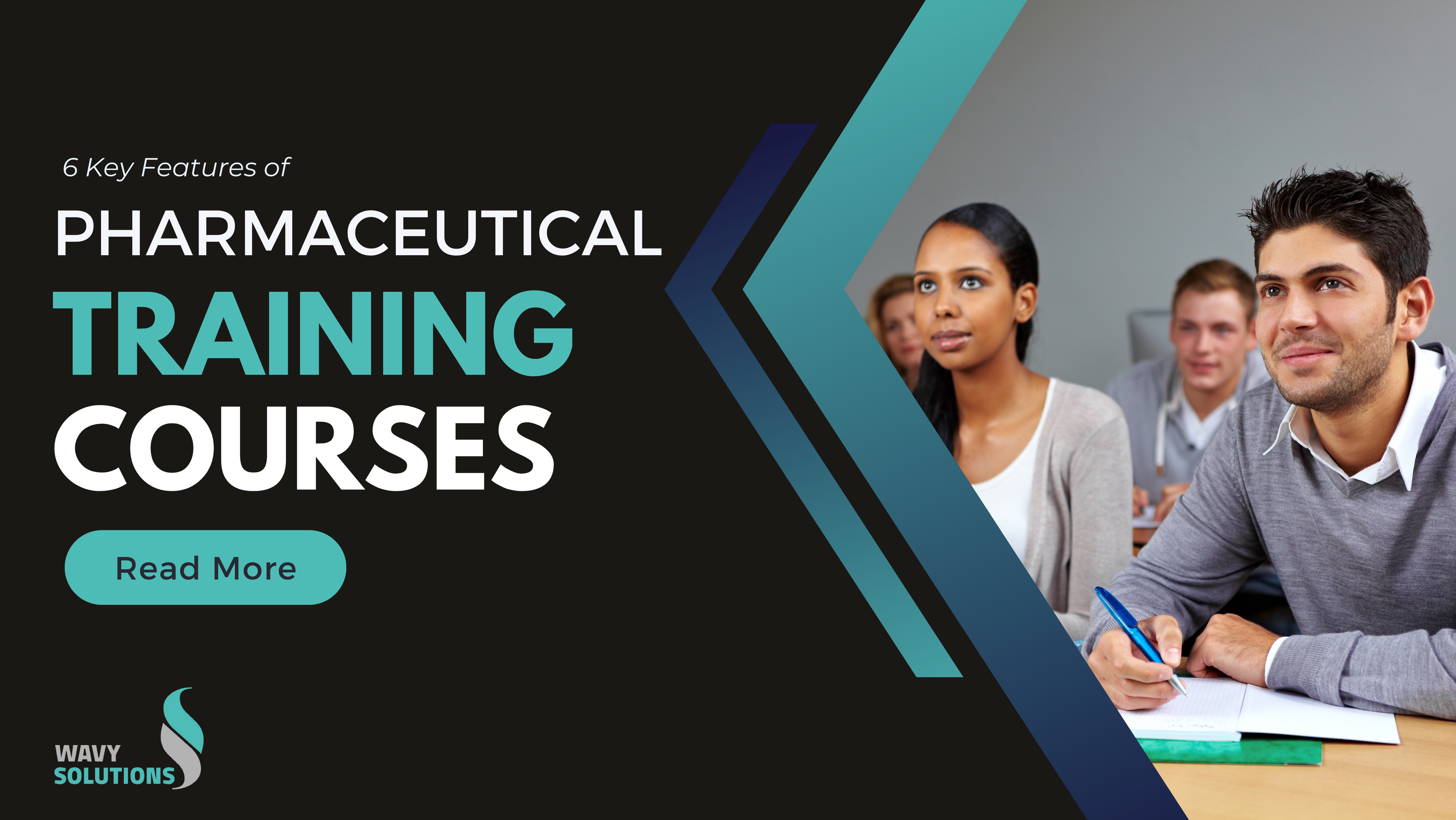6 Key Features Pharmaceutical Training Courses Must Incorporate Into Their Programs

The core operations of every organization are taking a transformative shift with the evolving cultural changes. Along similar lines, the pharmaceutical sector is gradually demonstrating adaptability and is getting equipped with sound knowledge that can meet market demands and present transformations. The new trend facilitating this shift is the adoption of robust training and development strategies that can design powerful pharmaceutical management courses enabling pharma personnel to acclimate to an ever-changing work milieu.
With the exponential growth path paved for the sector, it has become essential that both new and existing employees are well-trained. Consistent and ongoing training is essential, as each employee must develop a comprehensive industry skill set and adapt to evolving trends. This holistic approach keeps them aligned with the industry’s upward trajectory while they can sharpen their skills along the way.
We cover some essential elements that all types of pharmaceutical training courses must have to empower the pharmaceutical industry in thriving to achieve its goals and objectives.
Incorporating Essential Elements Into Pharmaceutical Training Courses
Every customized training solutions provider must majorly focus on three key aspects while designing a training program. One is about general skills such as anatomy, drugs, and diseases. The second is about sales including communication skills, sales techniques, rejection handling, and patient care. And the third is about compliance knowledge regarding sales codes, adverse event reporting, and privacy regulations.
Pharmaceutical management courses must be created and formulated keeping in mind these aspects and the below-mentioned features:
1. Simplifying Learning Paths for Easy Comprehension
Training leaders in the pharmaceutical solutions industry should design training courses that primarily focus on the current needs of learners. For instance, creating courses as per the learners’ preferred training method can significantly improve their capacity to practically implement the training into their packed schedules.
Nevertheless, it may become a challenge to accommodate various learning necessities of diverse audiences spanning various qualifications, job functionalities, cultural contexts, and hierarchies. A basic, predictable, user-friendly, localized training regimen in the pharmaceutical solutions business, with fewer complicated learning paths, is expected to result in a significant percentage of course completion.
2. Embracing Simplicity Over Extravagance to Enhance Engagement
When it comes to Pharmaceutical Training Courses, industry experts specifically lean away from training materials that focus excessively on gamification, animations, or elaborate voice-overs. They consider it as an external motivational factor that holds lesser appeal for dedicated learners who look forward to training as a crucial part of their mission in improving their proficiency. A minimalist, straightforward, and efficient design approach will resonate more with these learners fostering higher engagement.
3. Bite-sized Mobile Learning: Modules of 5-10 Minutes
The pharmaceutical solutions industry experts consider designing courses that can offer device flexibility and universal access. Nowadays, content designed for mobile devices can be formulated and centered around a singular pharmaceutical concept so that it can enhance retention and minimize distractions for learners. Keeping an uncluttered layout that highlights the key elements is more advisable as it comprehensively covers vital information within a limited timeframe.
4. Customized Training Modules Aligned with Job Responsibilities
Every pharmaceutical professional must have a foundational understanding of the industry, however, the scope of knowledge differs from person to person. Experts can design pharmaceutical training courses and modules that aim for specific job roles allowing exclusive coverage of relevant subjects and topics and removing irrelevant content.
For example, there are different training requirements for a sales manager and a marketing manager. Their roles diverge significantly, despite sharing some information needs. One needs to design customized pharmaceutical management courses for a marketing manager who aims to focus on the medicine’s consumer-oriented highlights that should be appealing. And in contrast, a sales representative would need in-depth insights into various attributes such as to facilitate pitching the drug to medical practitioners and retailers.
5. Swift Development to Meet the Needs of Agile Learners
The pharmaceutical industry has several rules that are always changing. Because of these developments, pharmaceutical job training courses must be often revised, sometimes immediately before they are given.
For example, when new drugs or treatments are offered swiftly, new training sessions or classes for pharma employees must be developed quickly.
6. Assessing Progress through Goal-oriented Performance Evaluations
Training courses are regarded incomplete if they do not contain a method to test what you’ve learned. Goal-based evaluations serve as objectives for each stage of training, allowing you to know what to aspire for. When you complete a program, receiving a certificate might help you feel more accomplished and involved.
Conclusion:
The pharmaceutical industry is evolving at great speed. It’s becoming more flexible, digital, and teamwork-focused. This means that people working in the pharmaceutical field need special training to handle these changes. That’s where Wavy Solutions comes in. We are the top pharmaceutical solutions industry provider and are experts in creating training programs for the pharmaceutical industry. Our courses are made just for the people in this field, so they give you the exact knowledge and skills you need for pharmaceutical management, following rules, and the pharma industry in general.
We are a customized training program provider and our training is easy to use on mobile devices, and we make sure it fits your specific job. In addition, we can make it work for people all over the world. If you’re in the pharmaceutical business, pharmaceutical management courses and other pharmaceutical training courses can help you stay ahead. Check out our website at www.wavysolutions.com to learn more about the different courses we offer for pharmaceutical training.
FAQs for Customized Pharmaceutical Training Programs:
1. What is a customized training program provider?
A customized training program provider is a specialized organization that tailors educational content and experiences to the specific needs and requirements of individuals or companies in the pharmaceutical industry. These programs are designed to address unique challenges and enhance skills within the context of pharmaceutical management and operations.
2. How do customized training programs differ from standard pharmaceutical training courses?
Customized training programs stand out by offering personalized curriculum development, flexible scheduling, and targeted content delivery. Unlike standard pharmaceutical training courses, customized programs are adaptable to the specific goals and objectives of the participants, making the learning experience more relevant and effective.
3. What are pharmaceutical management courses?
Pharmaceutical management courses are educational offerings that focus on developing leadership, strategic planning, and operational skills within the pharmaceutical industry. These courses cover various aspects, such as regulatory compliance, supply chain management, marketing strategies, and ethical considerations, to equip professionals with the expertise needed to excel in managerial roles.
4. How can pharmaceutical training courses benefit professionals in the industry?
Pharmaceutical training courses provide professionals with up-to-date knowledge, industry insights, and practical skills required for successful careers in the pharmaceutical solutions industry. These courses help participants stay informed about evolving regulations, cutting-edge technologies, and best practices, enabling them to make informed decisions and contribute effectively to the sector.
5. What role does the pharmaceutical solutions industry play in healthcare?
The pharmaceutical solutions industry plays a critical role in healthcare by researching, developing, producing, and distributing medications and therapies to prevent, treat, and manage various health conditions. It encompasses pharmaceutical manufacturers, researchers, regulatory agencies, and other stakeholders working collaboratively to ensure the safety, efficacy, and accessibility of pharmaceutical products worldwide.


